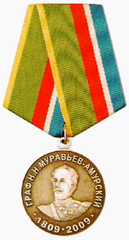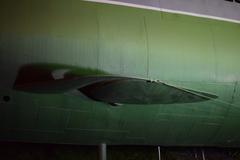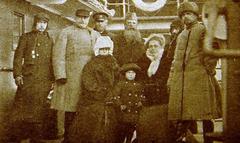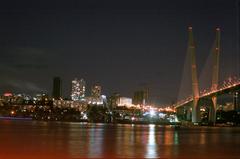
Vladimir K. Arseniev Museum of Far East History: Complete Visitor Guide
Date: 04/07/2025
Introduction
Situated in the heart of Vladivostok, the Vladimir K. Arseniev Museum of Far East History is a premier cultural and educational institution dedicated to preserving and interpreting the rich heritage of the Russian Far East. Named after renowned explorer Vladimir Klavdievich Arseniev, whose expeditions in the early 20th century revealed the region’s geography and diversity, the museum attracts more than 200,000 visitors annually. Its extensive collections and interactive exhibits offer a journey from prehistory and indigenous cultures to the Soviet period and the present day, making it a must-visit for history enthusiasts, families, and travelers alike.
This comprehensive guide details visiting hours, ticket prices, key exhibitions, amenities, accessibility, and practical tips to help you plan and enjoy your visit. For the most current information, visit the museum’s official website (Arseniev Museum Official Site, Vladivostok Travel).
Table of Contents
- Introduction
- Museum Origins and History
- Honoring Vladimir K. Arseniev
- Permanent and Temporary Exhibitions
- Visitor Information: Hours, Tickets, and Accessibility
- Museum Layout and Facilities
- Notable Highlights and Must-See Exhibits
- Visitor Experience and Amenities
- Tips for a Memorable Visit
- Frequently Asked Questions (FAQ)
- Impact, Recognition, and Community Role
- Enhance Your Visit
- Sources
Museum Origins and History
Founded in 1884 by the First Society of Scientists on Russia’s Pacific Coast, the museum was initially conceived as a repository for the region’s growing scientific and cultural collections. Its main building, located at 20 Svetlanskaya Street, is an architectural monument dating to the late 19th century. Over time, the museum has expanded to include several branches and now houses collections in archaeology, ethnography, natural history, and urban development (Arseniev Museum Official Site).
Honoring Vladimir K. Arseniev
The museum pays tribute to Vladimir Klavdievich Arseniev (1872–1930), whose pioneering explorations deepened understanding of the Russian Far East’s landscapes, indigenous cultures, and wildlife. His legacy is enshrined in exhibits about his expeditions and through a memorial house-museum preserved as a branch of the main institution.
Permanent and Temporary Exhibitions
Archaeology and Ancient History
- Jurchen Prince Esikuy’s Tomb Complex: A partial reconstruction of a 12th-century burial, featuring stone sculptures, a burial gate, and unique grave goods.
- Artifacts from the Paleolithic to the Medieval Era: Tools, pottery, and ornaments from ancient cultures like the Mohe, Balhae, Jin, and Dong Xia kingdoms.
- Ancient Burial with Alley of Spirits: Illustrates spiritual beliefs and funerary practices of early inhabitants.
Ethnography and Indigenous Cultures
- Itelmen Military Outfit: Complete set of 19th-century armor and weaponry from the Itelmen people.
- Nanai, Udege, Oroch, and Other Groups: Everyday objects, ritual items, and an extensive collection of carved and engraved bone artifacts.
Natural History
- Regional Flora and Fauna: Displays of stuffed sea animals, birds, insects, and botanical specimens from the Russian Far East.
- Interactive Ecosystem Exhibits: Immersive dioramas and multimedia presentations on local biodiversity.
Military and Weaponry
- Blades and Sabers: Swords and daggers from Russia, Japan, China, and beyond, including a saber awarded to heroes of the 1812 Patriotic War.
Porcelain and Decorative Arts
- Porcelain Collection: Rare Russian and East Asian porcelain pieces highlighting historical trade and cultural exchange.
Modern and Urban History
- Photographic Archives: Chronicling urban development, daily life, and major historical events in Vladivostok.
- Letters of Eleonora Lord Pray: Immersive exhibit based on letters and photographs from an American resident of Vladivostok, offering a unique personal perspective.
Temporary Exhibitions
- Rotating displays focus on subjects ranging from Ancient Egypt to contemporary art and regional history, often featuring multimedia and interactive elements (Vladivostok Travel).
Visitor Information: Hours, Tickets, and Accessibility
- Location: 20 Svetlanskaya Street, Vladivostok, Primorsky Krai, Russia, 690091
- Opening Hours: Daily from 10:00 AM to 7:00 PM (Main building; branch hours may vary)
- Tickets:
- Main building: 500 RUB
- Branch museums: 400 RUB
- Discounts for students, seniors, and children; children under 16 often free (arseniev.org)
- Accessibility: Ramps, elevators, and accessible restrooms available. Contact ahead for specific requirements.
- Getting There: Centrally located, easily reached by public transport, taxi, or on foot from the railway station and harbor. Parking is available nearby (Trip.com).
Museum Layout and Facilities
- Historic Main Building: Features ornate facades, spacious galleries, and modern amenities following renovations in 2011 (Wikipedia).
- Branches:
- City Museum (6 Peter the Great Street): Urban history and film screenings.
- Memorial House-Museum of Arseniev (7B Arseniev Street): Explorer’s home and legacy.
- Sukhanov House-Museum (9 Sukhanova Street): Tsarist-era official’s residence (Arseniev Museum).
- Facilities: Gift shop, café, cloakroom, free Wi-Fi, guided tour booking desk.
Notable Highlights and Must-See Exhibits
- Jurchen Prince Esikuy’s Tomb
- Itelmen Military Outfit
- Natural History Halls
- Eleonora Pray Letters Exhibit
- Porcelain and Weaponry Collections
- Temporary International and Regional Exhibitions
Visitor Experience and Amenities
- Guided Tours: Available in Russian, English, and other languages by prior arrangement; city walk tours also offered (Arseniev Museum).
- Interactive Elements: Multimedia displays, touchscreens, and audio guides.
- Educational Programs: Lectures, workshops, and children’s activities.
- Photography: Allowed in most areas (no flash or tripods); check for restrictions on special exhibits.
- Multilingual Support: Some English signage and materials; audio guides in multiple languages.
- Accessibility: Ramps, elevators, and accessible toilets; staff assistance available.
Tips for a Memorable Visit
- Check Exhibition Schedules: Visit the official website for current exhibitions and events.
- Plan for 2–3 Hours: The collections are extensive; allow ample time.
- Combine with City Sights: The museum is close to the Vladivostok Fortress, Russky Bridge, and the harbor.
- Dress Comfortably: Wear comfortable shoes for walking.
- Peak Times: Visit in the morning or on weekdays for a quieter experience.
- Seasonal Considerations: Best visited May–September for pleasant weather (Trip.com).
Frequently Asked Questions (FAQ)
Q: What are the Vladimir K. Arseniev Museum’s visiting hours?
A: Daily from 10:00 AM to 7:00 PM. Closed Mondays (check for updates on holidays).
Q: How much are tickets?
A: 500 RUB for the main building, 400 RUB for branches; discounts available.
Q: Is the museum accessible for visitors with disabilities?
A: Yes, ramps, elevators, and accessible restrooms are provided.
Q: Is photography allowed?
A: Yes, without flash or tripods.
Q: Are guided tours available in English?
A: Yes, by prior arrangement.
Q: Can I buy tickets online?
A: Yes, via the official website.
Impact, Recognition, and Community Role
The Vladimir K. Arseniev Museum is recognized regionally and internationally for its innovative exhibitions and educational outreach. It serves as a bridge between Russian, Asian, and indigenous cultures, fosters research and public dialogue, and has received numerous awards for its contributions to cultural preservation (museum statistics, TomDispatch article). The museum’s community programs, collaborations, and inclusive storytelling ensure its ongoing relevance as both a historical chronicle and a living cultural hub.
Enhance Your Visit
- Audio Guides and Apps: Download the Audiala app for audio tours and interactive content.
- Social Media: Follow the museum for updates on events and exhibitions.
- Combine with Walking Tours: Explore Vladivostok’s historical sites using GPSmyCity’s museum tour guide.
Sources and Further Reading
- Arseniev Museum Official Site
- Vladimir K. Arseniev Museum of Far East History
- Arseniev State Museum Branches and Exhibitions
- Trip.com: Vladivostok Museum Guide
- Vladivostok Travel: Arseniev Primorye Museum
- Vladivostok City: Attractions
- Wikipedia: Vladimir K. Arseniev Museum
- TomDispatch: Stalinist Purges in Museum Exhibits
- GPSmyCity: Vladivostok Museums Tour
For the latest updates on visiting hours, ticketing, and exhibitions, visit the museum’s official website. Plan your journey through Vladivostok’s history today!




